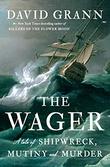What a year for David Grann! This fall, Martin Scorsese’s high-profile film adaptation has Grann’s 2017 book, Killers of the Flower Moon, back on everyone’s radar. And last spring, the New Yorker staff writer published his seventh book, The Wager: A Tale of Shipwreck, Mutiny, and Murder (Doubleday, April 18), about the ill-starred voyage of a British naval vessel in 1741. When two groups of survivors were discovered—each with a competing account of what had actually happened to the ship and its crew—the resulting court-martial became a referendum on truth and credibility. Grann says he found the story's themes to be startlingly relevant to the present day. The book made our list of the Best Nonfiction of 2023, and the author joined us on Zoom to answer some questions. Our conversation has been edited for length and clarity.
How did you come across this forgotten slice of history?
 Mutiny is a subject that has always interested me. I somehow stumbled into a library that had a digital scan of an 18th-century journal by John Byron, who was a 16-year-old midshipman on the Wager (and would later become the grandfather of the poet Lord Byron). My eyes were blurry because it’s written in a very archaic English, the S’s are printed as two F’s, and it was faded. Yet I kept pausing over these remarkable descriptions of the “perfect” hurricane, the scurvy, the madness, the shipwreck, and then the cannibalism, which he refers to simply as “that last extremity.” This weird little journal had one of the most extraordinary stories of survival that I’d ever come across.
Mutiny is a subject that has always interested me. I somehow stumbled into a library that had a digital scan of an 18th-century journal by John Byron, who was a 16-year-old midshipman on the Wager (and would later become the grandfather of the poet Lord Byron). My eyes were blurry because it’s written in a very archaic English, the S’s are printed as two F’s, and it was faded. Yet I kept pausing over these remarkable descriptions of the “perfect” hurricane, the scurvy, the madness, the shipwreck, and then the cannibalism, which he refers to simply as “that last extremity.” This weird little journal had one of the most extraordinary stories of survival that I’d ever come across.
What was most challenging about doing research for the book?
It took me a year to have a facility in reading the documents and understanding the coded language, because they wrote with a lot of symbols and abbreviations. I’m very grateful to the British historians [who helped me]; they were very patient in giving me these wonderful tutorials. At a certain point, the documents suddenly begin to speak to you in these unexpected and surprising ways.
When you were writing the book, did you have an ideal reader in mind?
My wife, Kyra Darnton, who’s a journalist, is always my first reader. When I finish a chapter, I give it to her, and then I’ll nervously watch her reading it. When I hear her say, “Oh God, no,” that’s where I’ve gone on some digression on shipbuilding, like Melville writing 10,000 words about ropes in Moby-Dick—except I can’t write like Melville. Then I know I have to take all that research and distill it down to three vivid paragraphs with [only] the most important facts. I have, quite literally, an “Oh God” file that contains all these digressions from my books.
What are some of your favorite books from 2023?
In part because I do so much historical research, I get behind [on current books]. I’m often looking for some element of diversion, so I read a lot of crime fiction and spy novels—that’s my go-to pleasure. This year I’ve read four or five of Mick Herron’s Slough House novels. I’m working my way through the series, and they’ve just been delightful and funny, and they have the best conceit. I also read S.A. Cosby’s All the Sinners Bleed, and I thought it was really powerful, a reinvention of the form. I would recommend that to anybody.
Tom Beer is the editor-in-chief.



































